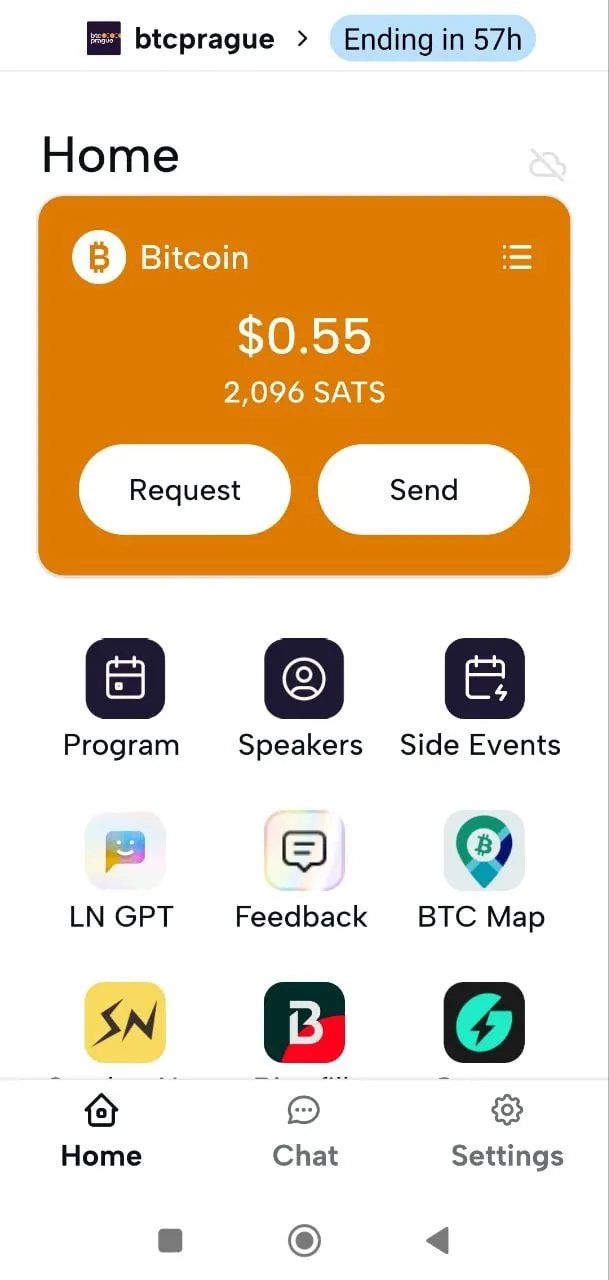Long-time Bitcoin advocate Obi Nwosu has set his sights on making the mass adoption of the leading cryptocurrency a reality, aiming to achieve this goal through his new project Fedi.
But how exactly? Through something called "Federations."
These provide an independent way for communities to take control of their money, data, and digital lives while still protecting each member’s privacy and autonomy, he said.
“This is a grand experiment,” Nwosu told Decrypt during last week's BTC Prague. “The first version of Fedi, Fedi Alpha, came out last month at Bitcoin Miami, and you can still join it. The next milestone was to show it working really quickly, so now there’s a second Federation, which is BTC Prague.”
BTC Prague, in Fedi’s terminology, is a pop-up federation, which means it is only temporary and will disappear in a set period of time. This pop-up federation was set up in such a way that any money that is not withdrawn is effectively donated to a charity picked by the conference organizers.
In the case of the BTC Prague federation, it was also an opportunity to test Fedi Alpha, the early release of the federated operating system, where the attendees of the conference were offered exclusive features such as accessing the event agenda, sending each other sats via Lightning Network, and the ability to broadcast messages in a chat.
"I don't know the numbers, but there are about 6,000 people at BTC Prague that are going to want to download the app," he said. "It shows you what we can do with just events. But taking all possible use cases, that can add up to 1 billion."
Exciting news! We launched the first ever Pop-Up Federation in @BtcPrague. Participants at the event are able to test the Prague Pop- Up Federation and share their feedback.
Prague is leveling up. 💪https://t.co/oGsZYfTFRB
— Fedi (@fedibtc) June 8, 2023
Built on an open-source protocol called Fedimint, Fedi aims to build community-focused “banks” that seek to help communities store Bitcoin and data together and simplify transactions between members by outsourcing custody to “guardians”— people that users personally know and trust.
Calling these trusted relationships "second party custodians,” Fedi is thus offering a compromise between the comfort of custodial storage and autonomy of self-custody, with an option of withdrawing funds into a user’s own self-custody Lightning wallet.
“The next big phase is a full production release where it's super easy to download the app and set up a federation,” said Nwosu. “In the coming months, we're also going to try and show how easy it is to extend the functionality of a Federation, and so we are hoping to have a really large number of what we call Fedi Mods—independent apps that guardians can deploy when setting up a Federation.”
Onboarding one billion people
While conferences and other events, according to Nwosu, is “a very powerful use case” of what Federations are capable of, he firmly believes that it’s just the beginning and the project can easily onboard the proverbial one billion new users.
“How many hundreds of millions go to conferences, festivals, events, concerts, and all these temporary gatherings a year? And there's normally some app that is really badly put together. And you download it and you never use it again,” argues Nwosu. “Here though, you join a Federation for one thing, but at the end, you still have a functioning platform that becomes a Bitcoin wallet and still has a use.”
Moreover, it can lead you to other things and you can continue using Fedi to set up things for your community or maybe for your company, he said.

Communities specifically are where new users can be onboarded, “especially as the cost of making transactions on-chain gets higher and higher,” said the Fedi CEO.
“People first move to Lightning, but the costs continue to rise. And then you'll realize that making channel rebalancing is also expensive. We saw that recently,” he said, referencing reshuffling balances in payment channels that Lightning nodes make to keep routing payments.
He further explained that as the costs of a channel rebalancing are generally the same if that channel is used by one person or a million people, this will mean that if you have a federation with 10,000 people that costs are shared among all those 10,000 people.
“This is why Federations work even in hyped markets, because all your costs are divided. Let's say you have 1,000 users and a $10 transaction, so instead of one person paying $10 to rebalance you are having one person paying $10 divided by 1,000, which is 0.1%,” said Nwosu.
On top of that, since the Federations use Fedi’s eCash notes—the implementation of digital cash invented by Dr. David Chaum—this also helps scale transactions as any transaction happening within a Federation doesn't even touch Lightning.
Fedi's offering for companies
According to Nwosu, these Federations can also be attractive to companies, “because companies are also communities with a common interest or common goal.”
"Right now, if companies want to custody their Bitcoin, they generally use third parties to do that because it's hard for them to do it themselves and there are some people who try to make it easier,” Nwosu told Decrypt. “But companies also have complex requirements, and if they set up a federation they can, for example, have the senior management team be the guardians of the Federation.”
Federations can also give companies the spending controls they want.
“They can say, well, this department can spend this much or it can make a certain payment. All that stuff can be added just like anyone can write programs for Windows or for your iPhone. You can also do it for a Federation,” said Nwosu.
According to him, corporations may also need other environments, such as integrations with accounting systems or tax systems with back-office systems, and because of the extensibility of elements it will be easy for third-party developers to provide those integrations.
“We're already talking to people to do that, but we won't do it ourselves,” said Nwosu. “We are building the platform, but over the coming year we will be talking to multiple developers around the world to make them aware that there's a whole new platform that they can build on and provide services.”
What about Fedi’s business model? According to Nwosu, it’s pretty straightforward.
“Fedimint is an open-source platform that allows people to set up their Federations, and whenever a transaction happens we add an additional small fee,” he said. “And I'm pretty sure now that people see it happening in a successful model, they will make competing products. Just like there's multiple web browsers, or multiple operating systems.”
The fee charged by Fedi will be “very reasonable,” added Nwosu, saying that “we can use that money to make the experience incredibly good.”

